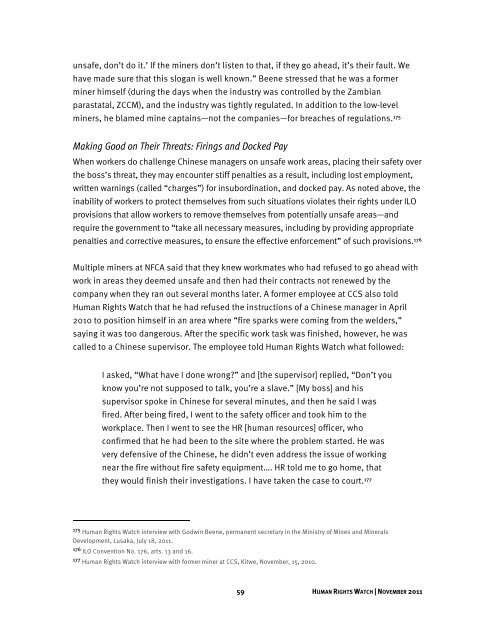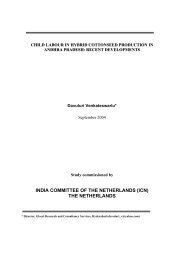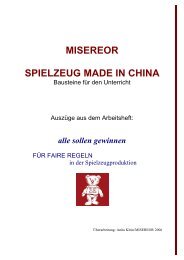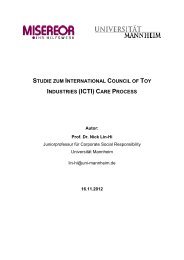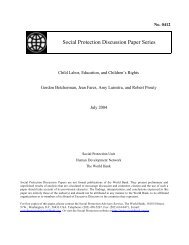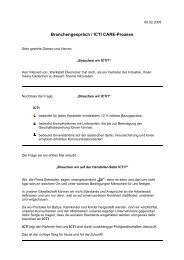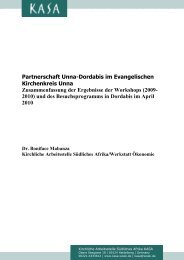“You'll Be Fired if You Refuse†- Human Rights Watch
“You'll Be Fired if You Refuse†- Human Rights Watch
“You'll Be Fired if You Refuse†- Human Rights Watch
You also want an ePaper? Increase the reach of your titles
YUMPU automatically turns print PDFs into web optimized ePapers that Google loves.
unsafe, don’t do it.’ If the miners don’t listen to that, <strong>if</strong> they go ahead, it’s their fault. We<br />
have made sure that this slogan is well known.” <strong>Be</strong>ene stressed that he was a former<br />
miner himself (during the days when the industry was controlled by the Zambian<br />
parastatal, ZCCM), and the industry was tightly regulated. In addition to the low-level<br />
miners, he blamed mine captains—not the companies—for breaches of regulations. 175<br />
Making Good on Their Threats: Firings and Docked Pay<br />
When workers do challenge Chinese managers on unsafe work areas, placing their safety over<br />
the boss’s threat, they may encounter st<strong>if</strong>f penalties as a result, including lost employment,<br />
written warnings (called “charges”) for insubordination, and docked pay. As noted above, the<br />
inability of workers to protect themselves from such situations violates their rights under ILO<br />
provisions that allow workers to remove themselves from potentially unsafe areas—and<br />
require the government to “take all necessary measures, including by providing appropriate<br />
penalties and corrective measures, to ensure the effective enforcement” of such provisions. 176<br />
Multiple miners at NFCA said that they knew workmates who had refused to go ahead with<br />
work in areas they deemed unsafe and then had their contracts not renewed by the<br />
company when they ran out several months later. A former employee at CCS also told<br />
<strong>Human</strong> <strong>Rights</strong> <strong>Watch</strong> that he had refused the instructions of a Chinese manager in April<br />
2010 to position himself in an area where “fire sparks were coming from the welders,”<br />
saying it was too dangerous. After the spec<strong>if</strong>ic work task was finished, however, he was<br />
called to a Chinese supervisor. The employee told <strong>Human</strong> <strong>Rights</strong> <strong>Watch</strong> what followed:<br />
I asked, “What have I done wrong?” and [the supervisor] replied, “Don’t you<br />
know you’re not supposed to talk, you’re a slave.” [My boss] and his<br />
supervisor spoke in Chinese for several minutes, and then he said I was<br />
fired. After being fired, I went to the safety officer and took him to the<br />
workplace. Then I went to see the HR [human resources] officer, who<br />
confirmed that he had been to the site where the problem started. He was<br />
very defensive of the Chinese, he didn’t even address the issue of working<br />
near the fire without fire safety equipment…. HR told me to go home, that<br />
they would finish their investigations. I have taken the case to court. 177<br />
175 <strong>Human</strong> <strong>Rights</strong> <strong>Watch</strong> interview with Godwin <strong>Be</strong>ene, permanent secretary in the Ministry of Mines and Minerals<br />
Development, Lusaka, July 18, 2011.<br />
176 ILO Convention No. 176, arts. 13 and 16.<br />
177 <strong>Human</strong> <strong>Rights</strong> <strong>Watch</strong> interview with former miner at CCS, Kitwe, November, 15, 2010.<br />
59 HUMAN RIGHTS WATCH | NOVEMBER 2011


